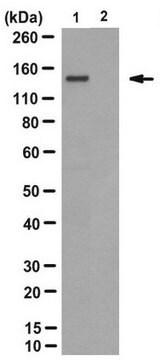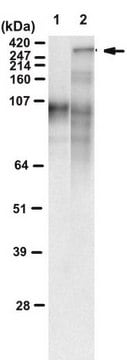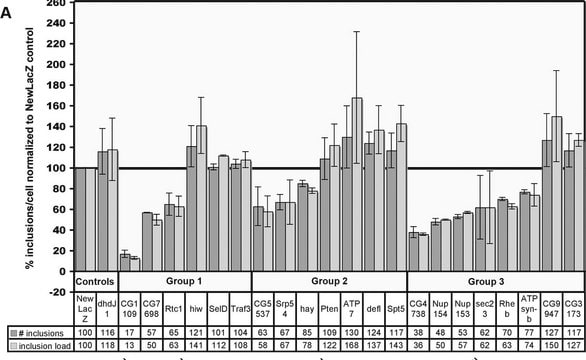MAB5360
Anti-Spinocerebellar Ataxia Type 3 Antibody, clone 1H9
ascites fluid, clone 1H9, Chemicon®
Sinonimo/i:
Ataxin-3, josephin
Scegli un formato
Scegli un formato
About This Item
Prodotti consigliati
Origine biologica
mouse
Livello qualitativo
Forma dell’anticorpo
ascites fluid
Tipo di anticorpo
primary antibodies
Clone
1H9, monoclonal
Reattività contro le specie
rat, human, monkey, mouse
Produttore/marchio commerciale
Chemicon®
tecniche
ELISA: suitable
immunocytochemistry: suitable
immunohistochemistry: suitable
immunoprecipitation (IP): suitable
western blot: suitable
Isotipo
IgG1
N° accesso NCBI
N° accesso UniProt
Condizioni di spedizione
dry ice
modifica post-traduzionali bersaglio
unmodified
Informazioni sul gene
human ... ATXN3(4287)
Descrizione generale
Spinocerebellar ataxia (SCA) is one of a group of genetic disorders characterized by slowly progressive incoordination of gait and often associated with poor coordination of hands, speech, and eye movements. Frequently, atrophy of the cerebellum occurs. The first ataxia gene was identified in 1993 for a dominantly inherited type called “Spinocerebellar ataxia type 1" (SCA1). Subsequently, as additional dominant genes were found they were called SCA2, SCA3, etc. Usually, the "type" number of "SCA" refers to the order in which the gene was found. At this time, there are at least 29 different gene mutations which have been found.
Specificità
Immunogeno
Applicazioni
A 1:500-1:5000 dilution of a previous lot was used in IH.
Immunoprecipitation:
A 1:500-1:5000 dilution of a previous lot was used in IP.
ELISA:
A 1:500-1:5000 dilution of a previous lot was used in ELISA.
Immunocytochemistry:
A 1:500-1:5000 dilution of a previous lot was used in IC.
Optimal working dilutions must be determined by the end user.
Qualità
Western Blot Analysis:
1:500 dilution of this antibody detected SPINOCEREBELLAR ATAXIA 3 on 10 µg of NIH/3T3 lysates.
Descrizione del bersaglio
Risultati analitici
Human SCA-3/MJD brain sections, NIH/3T3 lysate
Altre note
Note legali
Non trovi il prodotto giusto?
Prova il nostro Motore di ricerca dei prodotti.
Codice della classe di stoccaggio
10 - Combustible liquids
Classe di pericolosità dell'acqua (WGK)
nwg
Punto d’infiammabilità (°F)
Not applicable
Punto d’infiammabilità (°C)
Not applicable
Certificati d'analisi (COA)
Cerca il Certificati d'analisi (COA) digitando il numero di lotto/batch corrispondente. I numeri di lotto o di batch sono stampati sull'etichetta dei prodotti dopo la parola ‘Lotto’ o ‘Batch’.
Possiedi già questo prodotto?
I documenti relativi ai prodotti acquistati recentemente sono disponibili nell’Archivio dei documenti.
Filtri attivi
Il team dei nostri ricercatori vanta grande esperienza in tutte le aree della ricerca quali Life Science, scienza dei materiali, sintesi chimica, cromatografia, discipline analitiche, ecc..
Contatta l'Assistenza Tecnica.








